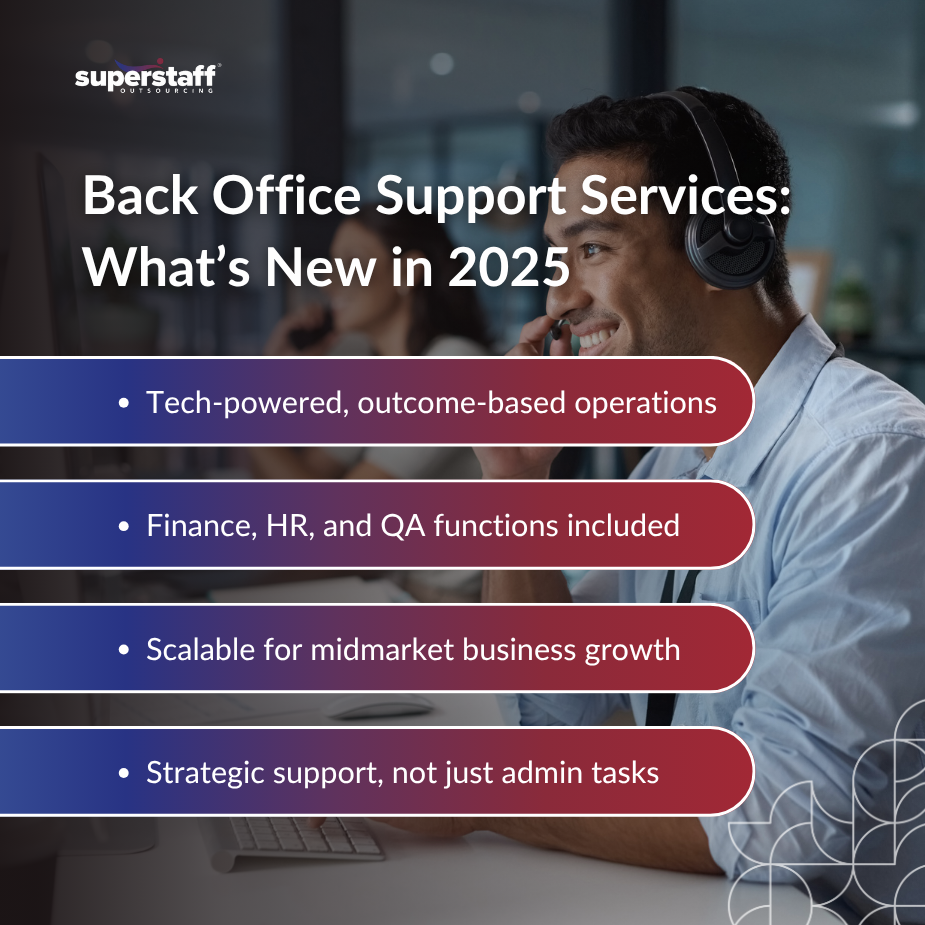
Most people never think about back office operations—until something breaks. Whether it’s a late invoice, an error in payroll, or a compliance deadline missed, these backend issues can quietly ripple into serious business disruptions.
Once considered strictly administrative, back office roles are now essential to business resilience and growth. Today, back office support services have quietly transformed into high-impact, tech-enabled operations that fuel smarter, faster, and more strategic companies.
In this blog, we’ll explore how outsourcing these services is helping businesses of all sizes become more efficient, scalable, and competitive.
Back Office, Reimagined for a Digital Era

There was a time when “back office” was synonymous with piles of paperwork, repetitive tasks, and siloed workflows. That’s no longer the case. The definition of back office has evolved—and so have expectations. In 2025, back office operations are tech-powered, data-driven, and strategically integrated with core business functions. Far from being stuck in the past, modern back office support services are often the drivers of digital transformation.
Think about today’s cloud-based finance platforms, customer relationship management systems, or HR information systems. These tools aren’t just helpful—they’re essential. And behind the scenes, trained teams operate and optimize these platforms daily. Real-time data visibility allows leadership to make smarter decisions faster, whether it’s tracking spending trends or forecasting inventory. The role has shifted from task execution to strategic enablement. Instead of simply entering invoices, teams are now ensuring financial processes are audit-ready, automated, and insightful.
But the transformation goes beyond tools. Businesses now expect outcome-based roles—functions that align with goals like improving accuracy, reducing processing time, or supporting compliance. And while automation plays a major role, it works best when paired with human expertise. That’s where outsourcing adds tremendous value: giving companies both the digital advantage and the skilled support to make it work.
The Full Spectrum of Services—Far Beyond Data Entry
Outdated views of back office work tend to stop at clerical tasks—data entry, form filling, basic filing. But back office support services today span a wide range of specialized functions, many of which are compliance-heavy or directly tied to customer-facing operations.
Take finance, for example. From accounts payable and receivable to payroll and budgeting support, outsourced finance professionals ensure that cash flow remains smooth, records stay clean, and reporting meets regulatory standards. And in the human resources space, back office teams assist with onboarding, recruitment coordination, and benefits administration—freeing internal HR to focus on culture and strategy.
E-commerce businesses often outsource inventory tracking, returns management, and order verification—functions that directly affect customer satisfaction but require meticulous backend coordination. Data management is another growing area. Companies rely on outsourced back office teams to validate, cleanse, and organize large datasets so internal analysts and executives can trust what they’re seeing.
Even quality assurance functions are finding a home in the back office. Whether it’s checking documentation, verifying data entries, or ensuring workflows meet compliance standards, modern outsourced teams are stepping far beyond traditional expectations.
Why Outsource Back Office Support Today?
So, what’s driving the surge in outsourcing these vital functions? Simply put, the business case for back office support services is stronger than ever. Companies are realizing that doing everything in-house doesn’t always mean doing it better—or cheaper.
Outsourcing offers flexibility. Businesses can scale their support functions based on seasonal needs or sudden growth without the lag time of hiring and training. When a U.S.-based company needs to onboard ten new accounting staff for a finance team, it might take months. But with a reliable outsourcing partner, that capacity can be added in weeks.
Cost control is another clear win. By outsourcing, companies reduce the expenses associated with full-time hires—benefits, equipment, office space, and HR overhead. At the same time, they gain access to a talent pool that is already trained, supervised, and performance-managed.
And perhaps most importantly, outsourcing enables agility. With the right partner, back office functions become a reliable engine running in the background, giving core teams the bandwidth to focus on customer growth, innovation, or market expansion.
Why the Philippines Leads in Back Office Outsourcing
In the global outsourcing landscape, the Philippines has earned its place as a top-tier destination—and not by accident. Over the past two decades, it has steadily built its reputation as a hub for both voice and non-voice business services. Today, it’s a go-to country for back office support services that require precision, professionalism, and cultural fluency.
The talent pool in the Philippines is one of its biggest assets. With a strong education system, high English proficiency, and a workforce familiar with Western business norms, the country consistently delivers quality at scale. Filipino professionals are often trained in global accounting standards, HR best practices, and data management frameworks—making them immediately effective in cross-border operations.
Infrastructure also plays a role. Government and private-sector investments have built a robust foundation of IT parks, fiber-optic connectivity, and cybersecurity measures. This ensures that outsourced teams are not just skilled, but also supported by reliable tech environments.
Cultural compatibility is another often overlooked advantage. Filipino professionals are known for their adaptability, respect for process, and commitment to customer satisfaction. That soft skillset, combined with technical capabilities, creates back office teams that are aligned, responsive, and collaborative.
What a High-Performing Back Office Team Looks Like
Having a back office team isn’t enough. What separates average teams from great ones is how they’re structured, trained, and managed. The best back office support services aren’t just about filling roles—they’re about building systems that run smoothly, scale easily, and consistently deliver results.
First, there’s onboarding. High-performing providers don’t drop agents into roles and hope for the best. They implement structured training programs tailored to client tools, workflows, and performance metrics. Every new hire understands the “why” behind their tasks.
Second, there’s visibility. Modern back office teams operate with performance dashboards, KPIs, and service level agreements that keep everyone accountable and aligned. Clients can track output, review process improvements, and identify bottlenecks in real-time.
And third, there’s integration. The most effective outsourced back office teams don’t operate in silos. They work in tandem with front-office functions, whether it’s sales ops, customer service, or supply chain. That cross-functional collaboration creates a seamless experience for the end customer—even if they never see the gears turning.
Case Snapshot – Back Office Support in Action
To understand the real impact of back office support services, consider this scenario: A mid-sized U.S. financial firm was struggling with late vendor payments and inaccurate monthly reports. Their in-house AP team was overwhelmed, and data quality was inconsistent. Instead of hiring additional local staff, they outsourced accounts payable and data QA functions to a team based in the Philippines.
Within six weeks, processing times were cut by 40%. With daily reconciliation and audit-ready documentation, reporting accuracy improved dramatically. More importantly, the company’s internal finance team could now shift its focus to strategic forecasting and budget planning—critical tasks that had long been neglected.
This wasn’t a rare outcome. It’s increasingly the new standard for businesses that leverage outsourced back office support services to rebalance their workload, improve quality, and move faster.
Conclusion: Why Back Office Support Services Are a Strategic Asset
Back office operations may happen behind the scenes, but their impact is front and center. In today’s fast-moving business environment, administrative excellence is no longer optional—it’s foundational. From financial precision to HR compliance and data accuracy, the strength of your back office directly shapes your company’s ability to compete.
With modern back office support services, companies are discovering the power of doing more with less—smarter, faster, and with greater strategic focus. Outsourcing unlocks that potential. It’s not just about cost-saving anymore. It’s about staying ahead of the curve, adapting in real-time, and building a foundation that scales with your vision.
If you’re ready to see how outsourced back office services can transform your operations, talk to SuperStaff. We help growth-focused businesses like yours build high-impact support teams that deliver behind the scenes so your business can shine out front. It’s time to turn your back office into your competitive edge.






